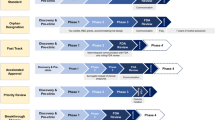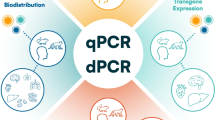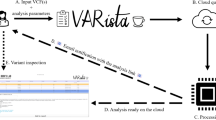Abstract
Patents involving human genes, human genetic material, and genotype-phenotype correlations are a reality and are increasingly having a negative effect on the clinical molecular diagnostic laboratory and on patient care. Specifically, gene patents and exclusive licensing of diagnostic testing has a detrimental effect on the quality of laboratory testing, the cost of testing, turnaround time, coordination of care, patient access to testing and the ability to confirm testing at a separate laboratory. In this article, gene patents are discussed from the perspective of a medical director of a molecular diagnostics laboratory, and the effect of such patents on clinical laboratory practice is examined
Similar content being viewed by others
Notes
Although purified nucleic acid could be prepared centrally and aliquots could be sent to multiple laboratories, this practice is discouraged by reference laboratories.
References
Association for Molecular Pathology. Association for Molecular Pathology joins the American Civil Liberties Union to challenge the constitutionality of gene patents [media release]. 2009 May 13 [online]. Available from URL: http://amp.org/advocacy/amp_challenges_gene_patents.cfm
American Civil Liberties Union. ACLU challenges patents on breast cancer genes: BRCA [media release]. 2010 Apr 16 [online]. Available from URL: http://www.aclu.org/free-speech-womens-rights/aclu-challenges-patents-breast-cancer-genes-0
Federal Court rules that Myriad’s BRCA patents are invalid; deems ‘isolated DNA’ unpatentable. GenomeWeb Daily News 2010 Mar 30 [online]. Available from URL: http://www.genomeweb.com/dxpgx/federal-court-rules-myriads-brca-patents-are-invalid-deems-isolated-dna-unpatent [Accessed 2010 May 19]
Jensen K, Murray F. Intellectual property: enhanced. Intellectual property landscape of the human genome. Science 2005 Oct 14; 310(5746): 239–40
Cook-Deegan R. Gene patents. In: Crowley M, editor. From birth to death and bench to clinic: the Hastings Center bioethics briefing book for journalists, policymakers, and campaigns. Garrison (NY): the Hastings Center, 2008 [online]. Available from URL: http://www.thehastingscenter.org/Publications/BriefingBook/Detail.aspx?id = 2174 [Accessed 2010 May 19]
Cho MK, Illangasekare S, Weaver MA, et al. Effects of patents and licenses on the provision of clinical genetic testing services. J Mol Diagn 2003 Feb; 5(1): 3–8
Klein RD. Gene patents and genetic testing in the United States. Nat Biotechnol 2007 Sep; 25(9): 989–90
Leonard DG. Medical practice and gene patents: a personal perspective. Acad Med 2002 Dec; 77 (12 Pt 2): 1388–91
Merz JF. Disease gene patents: overcoming unethical constraints on clinical laboratory medicine. Clin Chem 1999 Mar; 45(3): 324–30
Merz JF, Kriss AG, Leonard DG, et al. Diagnostic testing fails the test. Nature 2002 Feb 7; 415(6872): 577–9
Ledbetter DH. Gene patenting and licensing: the role of academic researchers and advocacy groups. Genet Med 2008 May; 10(5): 314–9
Bagg A, Braziel RM, Arber DA, et al. Immunoglobulin heavy chain gene analysis in lymphomas: a multi-center study demonstrating the heterogeneity of performance of polymerase chain reaction assays. J Mol Diagn 2002 May; 4(2): l8–9
Lutz BJ, Bowers BJ. Patient-centered care: understanding its interpretation and implementation in health care. Sch Inq Nurs Pract 2000 Summer; 14(2): 165–83; discussion 183-7
Acknowledgments
No sources of funding were used to assist in the preparation of this article. The author has no conflicts of interest that are directly relevant to the content of this article.
Author information
Authors and Affiliations
Corresponding author
Rights and permissions
About this article
Cite this article
Mann, K.P. Gene Patents. Mol Diag Ther 14, 137–140 (2010). https://doi.org/10.1007/BF03256365
Published:
Issue Date:
DOI: https://doi.org/10.1007/BF03256365




